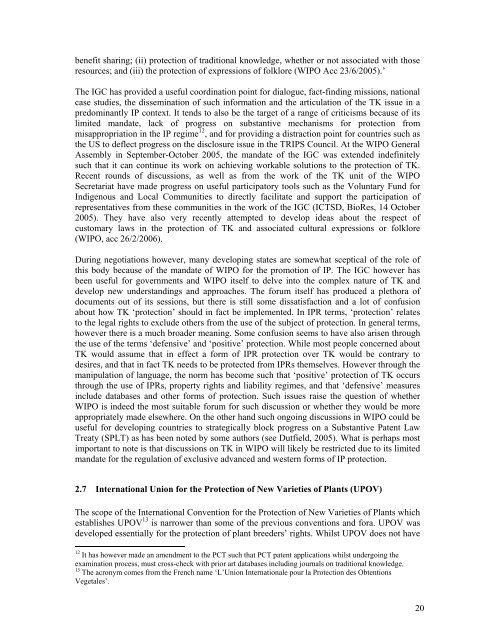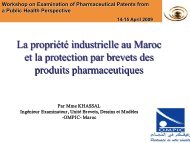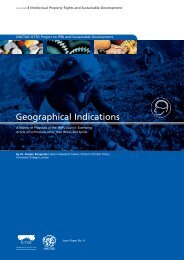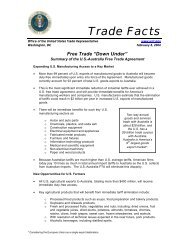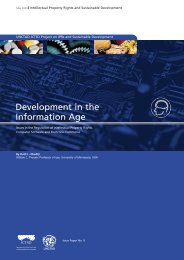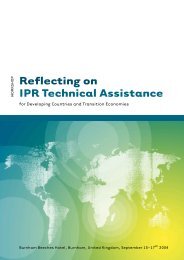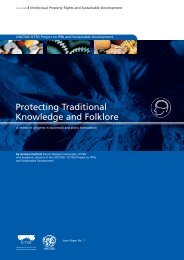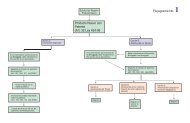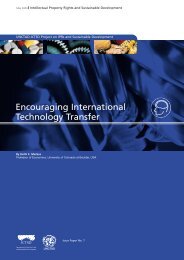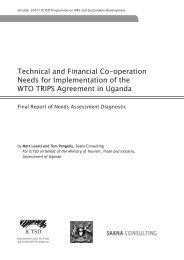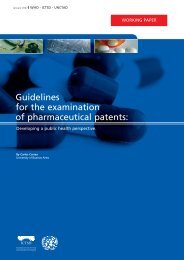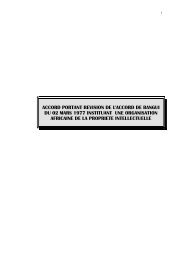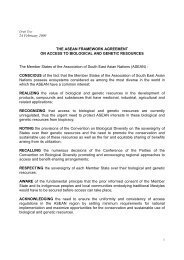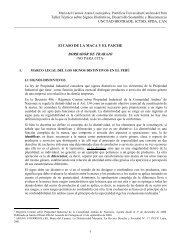Governance and Micropolitics of Traditional ... - IPRsonline.org
Governance and Micropolitics of Traditional ... - IPRsonline.org
Governance and Micropolitics of Traditional ... - IPRsonline.org
Create successful ePaper yourself
Turn your PDF publications into a flip-book with our unique Google optimized e-Paper software.
enefit sharing; (ii) protection <strong>of</strong> traditional knowledge, whether or not associated with those<br />
resources; <strong>and</strong> (iii) the protection <strong>of</strong> expressions <strong>of</strong> folklore (WIPO Acc 23/6/2005).’<br />
The IGC has provided a useful coordination point for dialogue, fact-finding missions, national<br />
case studies, the dissemination <strong>of</strong> such information <strong>and</strong> the articulation <strong>of</strong> the TK issue in a<br />
predominantly IP context. It tends to also be the target <strong>of</strong> a range <strong>of</strong> criticisms because <strong>of</strong> its<br />
limited m<strong>and</strong>ate, lack <strong>of</strong> progress on substantive mechanisms for protection from<br />
misappropriation in the IP regime 12 , <strong>and</strong> for providing a distraction point for countries such as<br />
the US to deflect progress on the disclosure issue in the TRIPS Council. At the WIPO General<br />
Assembly in September-October 2005, the m<strong>and</strong>ate <strong>of</strong> the IGC was extended indefinitely<br />
such that it can continue its work on achieving workable solutions to the protection <strong>of</strong> TK.<br />
Recent rounds <strong>of</strong> discussions, as well as from the work <strong>of</strong> the TK unit <strong>of</strong> the WIPO<br />
Secretariat have made progress on useful participatory tools such as the Voluntary Fund for<br />
Indigenous <strong>and</strong> Local Communities to directly facilitate <strong>and</strong> support the participation <strong>of</strong><br />
representatives from these communities in the work <strong>of</strong> the IGC (ICTSD, BioRes, 14 October<br />
2005). They have also very recently attempted to develop ideas about the respect <strong>of</strong><br />
customary laws in the protection <strong>of</strong> TK <strong>and</strong> associated cultural expressions or folklore<br />
(WIPO, acc 26/2/2006).<br />
During negotiations however, many developing states are somewhat sceptical <strong>of</strong> the role <strong>of</strong><br />
this body because <strong>of</strong> the m<strong>and</strong>ate <strong>of</strong> WIPO for the promotion <strong>of</strong> IP. The IGC however has<br />
been useful for governments <strong>and</strong> WIPO itself to delve into the complex nature <strong>of</strong> TK <strong>and</strong><br />
develop new underst<strong>and</strong>ings <strong>and</strong> approaches. The forum itself has produced a plethora <strong>of</strong><br />
documents out <strong>of</strong> its sessions, but there is still some dissatisfaction <strong>and</strong> a lot <strong>of</strong> confusion<br />
about how TK ‘protection’ should in fact be implemented. In IPR terms, ‘protection’ relates<br />
to the legal rights to exclude others from the use <strong>of</strong> the subject <strong>of</strong> protection. In general terms,<br />
however there is a much broader meaning. Some confusion seems to have also arisen through<br />
the use <strong>of</strong> the terms ‘defensive’ <strong>and</strong> ‘positive’ protection. While most people concerned about<br />
TK would assume that in effect a form <strong>of</strong> IPR protection over TK would be contrary to<br />
desires, <strong>and</strong> that in fact TK needs to be protected from IPRs themselves. However through the<br />
manipulation <strong>of</strong> language, the norm has become such that ‘positive’ protection <strong>of</strong> TK occurs<br />
through the use <strong>of</strong> IPRs, property rights <strong>and</strong> liability regimes, <strong>and</strong> that ‘defensive’ measures<br />
include databases <strong>and</strong> other forms <strong>of</strong> protection. Such issues raise the question <strong>of</strong> whether<br />
WIPO is indeed the most suitable forum for such discussion or whether they would be more<br />
appropriately made elsewhere. On the other h<strong>and</strong> such ongoing discussions in WIPO could be<br />
useful for developing countries to strategically block progress on a Substantive Patent Law<br />
Treaty (SPLT) as has been noted by some authors (see Dutfield, 2005). What is perhaps most<br />
important to note is that discussions on TK in WIPO will likely be restricted due to its limited<br />
m<strong>and</strong>ate for the regulation <strong>of</strong> exclusive advanced <strong>and</strong> western forms <strong>of</strong> IP protection.<br />
2.7 International Union for the Protection <strong>of</strong> New Varieties <strong>of</strong> Plants (UPOV)<br />
The scope <strong>of</strong> the International Convention for the Protection <strong>of</strong> New Varieties <strong>of</strong> Plants which<br />
establishes UPOV 13 is narrower than some <strong>of</strong> the previous conventions <strong>and</strong> fora. UPOV was<br />
developed essentially for the protection <strong>of</strong> plant breeders’ rights. Whilst UPOV does not have<br />
12 It has however made an amendment to the PCT such that PCT patent applications whilst undergoing the<br />
examination process, must cross-check with prior art databases including journals on traditional knowledge.<br />
13 The acronym comes from the French name ‘L’Union Internationale pour la Protection des Obtentions<br />
Vegetales’.<br />
20


